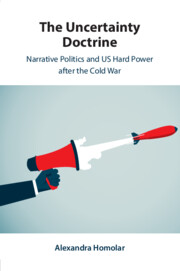
-
Select format
-
- Publisher:
- Cambridge University Press
- Publication date:
- 31 August 2023
- 14 September 2023
- ISBN:
- 9781009355131
- 9781009355117
- 9781009355155
- Dimensions:
- (229 x 152 mm)
- Weight & Pages:
- 0.52kg, 260 Pages
- Dimensions:
- (229 x 152 mm)
- Weight & Pages:
- 0.39kg, 260 Pages
You may already have access via personal or institutional login
Book description
The post-Cold War era is often seen as a missed opportunity of epic proportions for the United States to turn swords into ploughshares, with much of the blame placed on international developments. The Uncertainty Doctrine challenges the conventional take on post-Cold War history as imposed on the US by events largely outside its control. It shows in rich empirical detail how America's 'peace dividend' did not merely fall by the wayside but was actively undermined by the narrative contests over the security implications of the New World Order. Committed to understanding the ontological significance of narrative in (inter)national security, Alexandra Homolar demonstrates that political agents have the capacity to respond to a systemic shock through discursive adaptation and reorganization. While narrative politics may not always matter in US defense policy, at moments perceived as bifurcation points it can be decisive in why some strategic responses prevail over possible alternatives.
Awards
Short-listed, 2025 Hedley Bull Prize, European Consortium for Political Research
Reviews
‘A deeply impressive and sustained disquisition on one of the most vexed and contentious areas of study: US foreign policy since the end of the cold war. This is a work brimming with ideas and arguments: it deserves a large audience and to become a seminal scholarly text.'
Timothy J. Lynch - Professor of American Politics, the University of Melbourne
'A superb book that makes a genuine and highly original contribution to the field of US foreign policy studies. It provides a fascinating challenge to what we think we know about the post-Cold War era and is an essential read for anyone interested in the topic.'
Michelle Bentley - Royal Holloway, University of London
'After the Cold War, the ‘peace dividend’ never materialized. The reason, according to Alexandra Homolar in this fascinating new book, was not 9/11 and the resulting War on Terror. A decade before, she argues, a narrative of ’uncertainty’ had come to the fore. … This is a careful and impressive study of how narrative politics works to cast plausible alternatives to the margins.'
Ronald R. Krebs - Professor of Political Science, University of Minnesota
'A meticulously researched study of how security policy ideas emerge into strategic visions and frameworks for military planning. This is a must-read book on how, despite permissive conditions, political and intellectual actors and entrepreneurs can ensure that national security strategies and expenditures remain largely undisturbed.'
Inderjeet Parmar - City, University of London
‘The book offers theoretical and methodological contributions not just to the security narratives space but also to our understanding of how political actors respond to and capitalize on political events … the book extends our understanding of uncertainty’s uses in the making of security strategy.’
Sophie Kaldor Source: International Affairs
Contents
Metrics
Altmetric attention score
Full text views
Full text views help Loading metrics...
Loading metrics...
* Views captured on Cambridge Core between #date#. This data will be updated every 24 hours.
Usage data cannot currently be displayed.
Accessibility standard: Unknown
Why this information is here
This section outlines the accessibility features of this content - including support for screen readers, full keyboard navigation and high-contrast display options. This may not be relevant for you.
Accessibility Information
Accessibility compliance for the PDF of this book is currently unknown and may be updated in the future.


